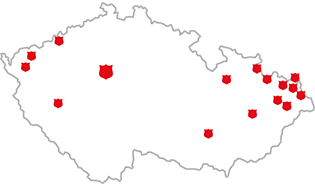Světový den humanitárních pracovníků se od roku 2008 každoročně slaví 19. srpna. Jako připomínku pumového útoku na sídlo OSN v Bagdádu v roce 2003, při kterém bylo zabito 22 lidí, nejen humanitárních pracovníků, ale i šéf mise OSN v Iráku či komisař OSN pro lidská práva, ho vyhlásilo Valné shromáždění OSN. Tento den není pouze připomínkou této tragické události, ale také příležitostí vyzdvihnout práci, úsilí, odvahu a profesionalitu humanitárních pracovníků, kteří pomáhají druhým.
Světový den humanitárních pracovníků zvyšuje povědomí veřejnosti o jejich práci. Při této příležitosti si i Armáda spásy dovolí vyzdvihnout práci svých zaměstnanců při pomoci oblastem zasaženým tornádem, které prošlo několika obcemi na pomezí Břeclavska a Hodonínska na jižní Moravě ve čtvrtek 24. června 2021 okolo 19:20 hodin večer. Podle předběžného hodnocení Českého hydrometeorologického ústavu šlo o silné tornádo doprovázené savými víry, které dosáhlo síly F4 na Fujitově stupnici, jednalo se tedy o druhé nejsilnější možné tornádo. Prošlo úsekem dlouhým 26 kilometrů, v šířce, s odchylkami, zhruba půl kilometru. Kriticky zasaženo bylo sedm obcí, nejvíce postiženy byly Moravská Nová Ves, Mikulčice, Hrušky, Lužice a městské části Hodonína Bažantnice a Pánov.
„V dotčených obcích bylo poničeno asi 1 200 staveb včetně veřejných, zemědělských a průmyslových budov, dále velký počet stromů a vozidel. Silně zasažena byla infrastruktura včetně druhého železničního koridoru. Škody na soukromém i veřejném majetku byly podle předběžných odhadů vyčísleny na 15 miliard korun. Ke zbourání bylo určeno asi 200 domů. Podle zjištění pracovníků organizace ADRA a Člověk v tísni bylo silně poškozeno cca 1600 domů,“ uvádí David Jersák, oblastní ředitel sociálních služeb Armády spásy.
V průběhu večera a následujícího dne bylo ošetřeno několik set zraněných osob a šest osob zemřelo. V evropském měřítku se jednalo o tornádo s největším počtem obětí od roku 2001 a zároveň do té doby nejsilnější a nejsmrtelnější meteorologickou událost v Evropě roku 2021. Se změřenou intenzitou F4 se také jedná bezpochybně o historicky nejsilnější evidované tornádo na českém území. Jediný doklad o podobně ničivém tornádu je z Kosmovy kroniky české pro území Prahy a den 30. července 1119. Tornádo způsobilo enormní škody nejen svou samotnou silou, ale i tím, že jeho trajektorie vedla přímo pásem lidnatých sídel.
Armáda spásy na událost reagovala ihned druhý den ráno, kdy se operativně sešel sociální management. „Domluvili jsme se, že Armáda spásy nebude nic podnikat na vlastní pěst. Vše bude řádně komunikováno a koordinováno s krizovými složkami v příslušném regionu. V podobných situacích je vždy největší důraz kladen na dobrou koordinaci pomoci a obecně logistiku,“ říká Jan František Krupa, národní ředitel sociálních služeb Armády spásy a doplňuje: „Náš pracovník pověřený řízením pomoci oslovil národního koordinátora orgánu PANEL (oborový orgán řešící podobné situace), a sdělil mu rámcově, v jakých oblastech je AS schopna nabídnout součinnost. Zároveň jsem byl v kontaktu s krizovým štábem JMK, Diecézní charitou a Krajským operačním a informačním střediskem HZS JMK, oddělením ochrany obyvatelstva a krizového řízení.“
Ihned po katastrofě probíhalo v postižených vesnicích vyhledávání zasypaných lidí, případně byla nabízena psychologická intervenční pomoc, a to nejsou domény Armády spásy. Bylo zřejmé, že během několika málo dní ale bude zapotřebí finanční i materiální pomoci a dobrovolníci k uklízení následků po katastrofě.
„Počítali jsme s několika variantami zapojení a v průběhu období byly všechny v různé míře využity. Jednalo se o distribuci potravin a hygieny, v rámci možností a aktuálního sortimentu Potravinové banky Brno, zajištění distribuce potřebného menšími auty, nabídka darovaného oblečení a popř. dalšího sortimentu. Vytvořili jsme dobrovolnický tým, který mohl odcestovat do postižené oblasti pomoci uklízet následky katastrofy, ve kterém se dosud vystřídalo 12 kolegů a kolegyň, ale do práce se zapojila další řada kolegů a kolegyň samostatně, kteří se přidali jako dobrovolníci a byli řízeni místními krizovými štáby. Zároveň jsme vyhlásili účelovou finanční sbírku, kdy jsme oslovili zejména naše pravidelné podporovatele, kteří mohli využít této, pro ně důvěryhodné, cesty k podpoře lidí postižených tornádem a celkem poskytli 1,1 mil. Kč, z čehož jsme uvolnili finanční prostředky pro nákup potravin a dalšího nezbytného materiálu,“ hodnotí David Jersák.
V průběhu pomoci byly opakovaně obslouženy v každé z pěti nejpostiženějších obcí desítky osob. Nejčastější poskytnutou pomocí bylo zajištění jídla a nápojů (chlazených i teplých), protože kromě budov byla zásadně poškozena infrastruktura (elektrorozvody, rozvody plynu a vody) a tudíž velká část domácností neměla možnost si doma jakoukoli stravu připravovat. Byli odkázáni na věci konzumovatelné bez nutnosti tepelné úpravy. Krizovým štábem byla strava zajištěna zejména pro členy IZS a příslušníky Armády ČR, a společně s nimi také i pro potřebné občany. „Nicméně opakovaně nebyli pokryti všichni, kteří tuto pomoc potřebovali zajistit. Našim hlavním cílem v tomto období bylo tyto „anomálie v systému“ vyhledávat a potřebné pro občany zajišťovat. Součástí takto obsloužené veřejnosti byli i pracující dobrovolníci. Protože se jednalo o nejteplejší měsíc v roce, velkou část námi zajišťované pomoci byly rovněž chlazené nápoje,“ hodnotí David Jersák a závěrem dodává: „Nadále monitorujeme a vyhodnocujeme způsob a míru další pomoci, kterou jsme schopni postiženým občanům poskytnout.“
Armáda spásy v postižené oblasti sklízela opakovaně stejnou zpětnou vazbu: „Díky vaší pomoci jsme schopni tu situaci nějak zvládat. Neumíme si představit, jaké by to bylo bez toho, co pro nás děláte.“
ENG:
The Importance of the Work of Humanitarian Workers Is Also Brought into Focus by the Recent Disaster in South Moravia
Since 2008, World Humanitarian Workers‘ Day (or World Humanitarian Day) has been celebrated every year on August 19th. It was established by the UN General Assembly as a reminder of the 2003 bombing of the UN headquarters in Baghdad, which killed 22 people, including not only humanitarian workers but also the head of the UN mission in Iraq and the UN Commissioner for Human Rights. This day is not only a reminder of this tragic event, but also an opportunity to highlight the work, effort, courage, and professionalism of humanitarian workers who help others.
World Humanitarian Workers‘ Day raises public awareness of their work. On this occasion, Armáda spásy would also like to highlight the work of its employees in helping the areas affected by the tornado, which passed through several villages on the border of Břeclav and Hodonín in southern Moravia on Thursday, June 24th, 2021, at around 7:20 PM. According to a preliminary evaluation by the Czech Hydrometeorological Institute, it was a strong tornado accompanied by absorbent vortices, which reached the strength of F4 on the Fujita scale; thus, it was the second strongest possible degree of tornado. It passed through an area that was 26 kilometres long and about half a kilometre wide (with deviations). Seven municipalities were critically affected, the most affected were Moravská Nová Ves, Mikulčice, Hrušky, Lužice and the Bažantnice and Pánov districts of Hodonín.
“In the affected municipalities, about 1,200 buildings were damaged, including public, agricultural, and industrial buildings, as well as very many trees and vehicles. The infrastructure, including the second railway corridor, was severely affected. According to preliminary estimates, the damage to both private and public property has been estimated at 15 billion crowns. About 200 houses have been marked for demolition. According to the findings of the employees of ADRA, and People in Need, a total of approximately 1,600 houses were severely damaged,” says David Jersák, a Regional Director of the Social Services of Armáda spásy.
Several hundred injured people were treated during the evening and the following day; a total of six people died. On a European scale, it was the tornado with the largest number of victims since 2001, and at the same time the strongest and deadliest meteorological event in Europe in 2021. With the measured intensity of F4, it is also the historically strongest undoubtedly registered tornado in the Czech territory. The only evidence of a similarly destructive tornado is in Cosmas‘ Chronica Boemorum (Chronicle of the Czechs), and that on July 30th, 1119, in the Prague area. The tornado caused enormous damage not only because of its own power as such, but also because of the fact that its trajectory went directly through a zone of densely populated settlements.
Armáda spásy responded to the event the very next morning when the Social Management met operationally. “We agreed that Armáda spásy would do nothing on its own. Everything would be properly communicated and coordinated with the emergency forces in the region. In similar situations, the greatest emphasis is always placed on good coordination of help and on logistics in general,” says Jan František Krupa, the National Director of Social Services of Armáda spásy, and he continues: “Our colleague who had been appointed to coordinate the help contacted the national coordinator of the PANEL body (a professional body dealing with similar situations), outlining in which areas Armáda spásy would be able to offer cooperation. Simultaneously, I have been in contact with the crisis staff of the South Moravian Region, the Diocesan Charity, and the Regional Operational and Information Centre of the Fire and Rescue Service of the South Moravian Region, Department of Civil Protection and Crisis Management.”
Immediately after the disaster, the municipalities affected were being searched through for people buried under the debris; eventually, psychological intervention assistance was being offered as well – and these are not the domains of Armáda spásy. It was clear that in a few days, however, financial and material assistance would be needed, as well as volunteers to clean up the aftermath of the disaster.
David Jersák reports: “We anticipated several ways of involvement, and during the period they were all used to varying degrees. These included distribution of foodstuffs and hygiene aids within the possibilities and current reserves of the Brno Food Bank, ensuring the distribution of the necessities by smaller cars, as well as the provision of a range of gifted clothing and eventually of other items. We established a volunteer team that was able to go to the affected area to help clean up the aftermath of the disaster; so far, 12 colleagues (both male and female) have engaged in the work of this team, but a number of other colleagues have joined the work as well, joining as volunteers and being managed by local crisis staffs. We also set up a special-purpose financial collection addressing, in particular, our regular supporters, who were able to use this way which they trust to support those affected by the tornado; they have provided a total of approximately CZK 1.1 million from which we have released funds for the purchase of foodstuffs and other necessary material.”
During the assistance, dozens of people were repeatedly served in each of the five most affected municipalities. The most common assistance rendered was the provision of food and beverages (refrigerated and hot), the reason being that not only buildings, but also the infrastructure (electricity, gas, and water distribution networks) was crucially damaged and therefore a large part of households did not have the opportunity to prepare any food at home. They had to depend on items that could be consumed without any need for heat treatment. The crisis staff provided food mainly to the members of the IRS and members of the Army of the Czech Republic, and together with them also to the needy citizens. “However, repeatedly, not everyone who needed this help was served. Our main goal during this period was to find these ‘anomalies in the system’ and to provide citizens with what they needed. The working volunteers were also part of the public served in this way. Because it was the hottest month of the year, a large part of the assistance we provided consisted of cold drinks,” says David Jersák, and he concludes: “We continue to monitor and evaluate the manner and level of further assistance we are able to provide to the affected citizens.”
Armáda spásy has repeatedly received the same feedback in the affected area: Thanks to your help, we are able to manage the situation somehow. We can’t imagine what it would be like without what you are doing for us.”




